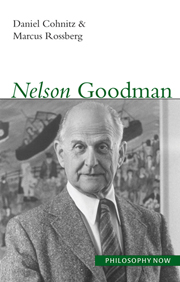Book contents
- Frontmatter
- Contents
- Acknowledgements
- Abbreviations
- 1 The worldmaker's universe
- 2 If this were an emerald it would be grue: problems and riddles of induction
- 3 The big picture
- 4 Particulars and parts
- 5 From Vienna Station to Boston Terminus
- 6 Follow the sign
- 7 Diagnosing art
- 8 Starmaking
- 9 Never mind mind, essence is not essential, and matter does not matter
- List of symbols
- Glossary of technical terms
- Further reading
- Notes
- Bibliography
- Index
4 - Particulars and parts
- Frontmatter
- Contents
- Acknowledgements
- Abbreviations
- 1 The worldmaker's universe
- 2 If this were an emerald it would be grue: problems and riddles of induction
- 3 The big picture
- 4 Particulars and parts
- 5 From Vienna Station to Boston Terminus
- 6 Follow the sign
- 7 Diagnosing art
- 8 Starmaking
- 9 Never mind mind, essence is not essential, and matter does not matter
- List of symbols
- Glossary of technical terms
- Further reading
- Notes
- Bibliography
- Index
Summary
In Chapter 3 we saw that one consequence of taking philosophy to be directed at understanding and elucidation is that a philosophical explication cannot be given in terms of unintelligible entities. That was the reason why Goodman did not accept an analysis of meaning in terms of intensions. Intensions are not the only philosophical constructions he repudiates, however. Goodman is, among other things, most famous for another radical doctrine: his nominalism.
In the twentieth century the debate between realism and nominalism was an almost foolproof source of heated discussion and verbose polemic (and sometimes rather entertaining rhetoric), and it still is today. The conflict is over ontology. The nominalist denies the existence of certain objects, while the realist affirms their existence. There are different ways in which one can be a nominalist depending on, for example, what kinds of things it is that one does not believe to exist. We shall distinguish these below. Often the nominalist denies the existence of abstract objects (such as numbers, shapes or groups) or universals (such as redness, courage or density). Doing so has a deep impact on disciplines such as philosophy of science and philosophy of mathematics, but also in all areas where metaphysical considerations play a role. We shall also see that there is a specific twist to Goodman's nominalism. The debate has been rekindled (if it ever really died out) in the past twenty years or so, which makes Goodman's contribution to the field of particular interest.
- Type
- Chapter
- Information
- Nelson Goodman , pp. 75 - 98Publisher: Acumen PublishingPrint publication year: 2006



